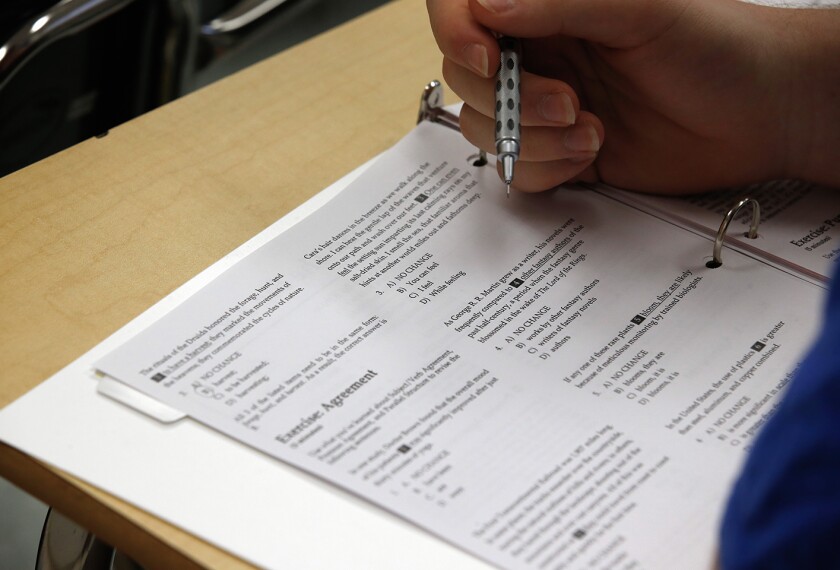Today, Lucy Crehan, author of ‘Cleverlands: The secrets behind the success of the world’s education superpowers', discusses school accountability systems in other countries and how they could provide models for the United States.
For those of you reading this on your computer: open a Word document, type accountability, right-click it and select ‘synonyms.’ Just in case you aren’t, I’ll do it for you. Here is what you’d likely find:
- ‘Culpability’
- ‘Liability’
- ‘Answerability’
- ‘Responsibility’
If you’re an educator, which word do you think most applies to how the administration responds to you when your students haven’t done as well on their tests as you’d hoped? Are you held culpable? Liable? Or answerable and responsible?
If you’re leading a school in which the overall outcomes have declined, have a think about how school management will be treated by the local government. Do you expect a tough conversation with the superintendent, addressing ways forward to improve your students’ scores? Or do you fear for your job, or the continued existence of your school?
I’ve spent time working in schools in five of the world’s top performing education systems—Finland, Canada, Japan, Singapore, and Shanghai—and one thing about school accountability in each of these places surprised me.
It wasn’t the absence of accountability. Although you may have heard the legend that there are no universal standardized exams in Finland (and it is a legend, not a myth), local leaders of education have a good idea of how individual schools are doing because they ask for a sample of students from each school to take a test. Singapore and Shanghai collect school test data and have school inspections (though no longer publish the results of either); Canadian students in most provinces sit for provincial assessments four or five times throughout their school life; and in Japan, teams of inspectors visit a school five times in one year when it’s that school’s turn for an inspection.
What surprised me was the response to underperformance. I’m from England, and our approach to accountability is similar to the approach in the States. Our school test results are made public, and when schools find themselves at the bottom of the school rankings, a common response is to change the management. The management are held liable, or culpable, for those poor results. And perhaps they should be.
In contrast, the intensive inspections in Japan lead to a comprehensive report with recommendations for improvement, and the local government moves an expert leader and high-rated teachers to schools that need them in the next reshuffle. Poor teachers or leaders won’t lose their jobs, but they will undergo compulsory additional training. In Shanghai, schools that are struggling will be matched with a successful school in a similar context, and a team of teachers and leaders from the successful school will come and work in the weaker school for a few months, demonstrating how to teach well and turn the school around, until they’ve built the capacity of their colleagues to continue with this on their own.

The Canadian superintendents will have those tough conversations with principals in response to student failure, and with them, plan an approach to school turnaround, which includes putting them in touch with successful schools to learn from. In Finland, school principals will lose their jobs in the cases of continued underperformance or complaints, but this is as a last resort rather than a general school-improvement strategy.
In all of these countries, the first response to underperformance is to support, not sanction.
Sometimes firing the management or closing a school is appropriate. But it depends on the cause of the problem. Are children and schools failing because their teachers and school leaders aren’t working hard enough? Or are they failing because they don’t know how to improve? If it is the former, then sanctions may well be what are needed to motivate them to work harder. But if it is the latter, then the threat of closure or public shame won’t make any positive difference to their outcomes.
The new ESSA legislation leaves space for local and state-level governments to make this decision for themselves, as unlike the NCLB act, it doesn’t require specific sanctions in response to underperformance. Education leaders should make the most of that opportunity and look outwards for inspiration, rather than continuing with a familiar but less effective approach. Replacing the management as a school improvement strategy will only work if there are more than enough successful leaders to go around—until that happens, we need to learn from the world’s most successful systems, and start building capacity instead.
Connect with Lucy and Heather on Twitter.
Image courtesy of Asia Society. Photographer: Sarah Lovrien.



